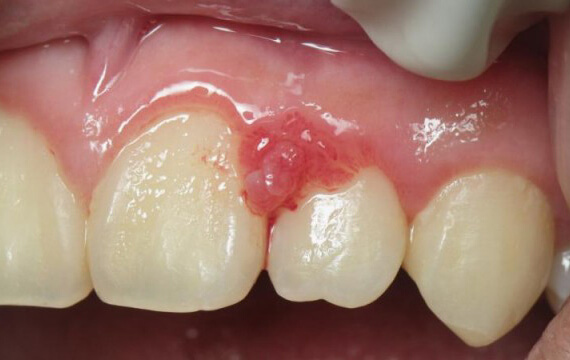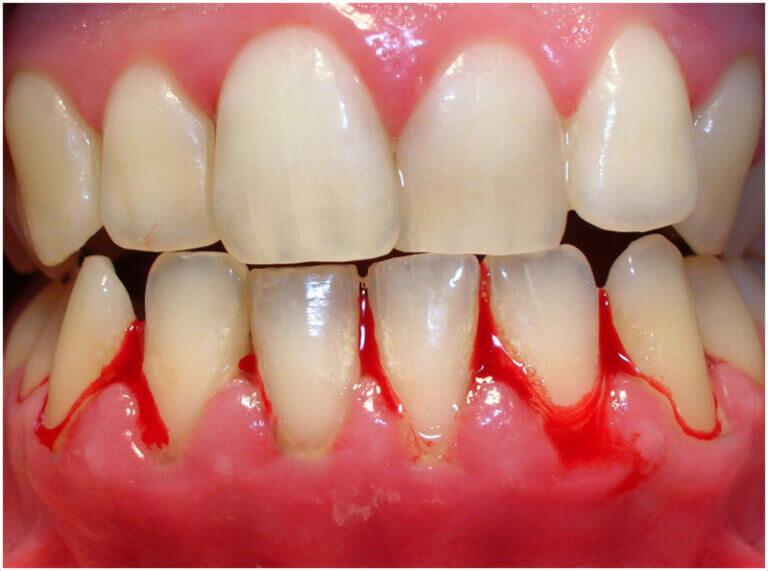Pregnancy Gingivitis

What Is Pregnancy Gingivitis?
Pregnancy gingivitis is a common dental condition that affects many expecting mothers. It is characterized by inflammation of the gums, leading to redness, swelling, and bleeding, particularly when brushing or flossing. The hormonal changes during pregnancy, especially the increase in progesterone, make the gums more susceptible to the plaque and bacteria that cause gingivitis. While pregnancy gingivitis is generally mild and manageable, it is essential to address it promptly to prevent more severe oral health issues. Understanding the causes, symptoms, and preventive measures can help ensure a healthy pregnancy and a healthy smile.
Before you contact a Toronto dentist to examine Pregnancy Gingivitis, there are some things you should know as a patient:
- Why Do I Have Pregnancy Gingivitis?
- Signs And Symptoms Of Pregnancy Gingivitis
- Treatment Options For Pregnancy Gingivitis
- Managing Pregnancy Gingivitis Until You Can See The Dentist
- Frequently Asked Questions About Pregnancy Gingivitis
If you have questions about Pregnancy Gingivitis or other dental problems, please contact us for more information.
Why Do I Have Pregnancy Gingivitis?
Pregnancy gingivitis is caused by several factors unique to pregnancy. Understanding these reasons can help you take preventive measures and seek appropriate treatment.
- Hormonal Changes: Increased levels of progesterone during pregnancy can make your gums more sensitive to plaque, leading to inflammation and gingivitis.
- Increased Blood Flow: Pregnancy increases blood flow to your gums, making them more prone to swelling and bleeding, especially in response to plaque buildup.
- Altered Immune Response: Your immune system changes during pregnancy, which can affect how your body responds to the bacteria that cause gingivitis.
- Morning Sickness: Frequent vomiting can expose your teeth and gums to stomach acids, increasing the risk of gum irritation and infection.
- Dietary Changes: Pregnancy cravings and changes in eating habits can lead to increased consumption of sugary foods, which contribute to plaque formation and gum disease.
- Neglected Oral Hygiene: Fatigue and nausea may make it difficult to maintain regular brushing and flossing routines, leading to plaque buildup and gingivitis.
By recognizing these factors, you can better understand why pregnancy gingivitis occurs and take steps to mitigate its effects. Regular dental visits and good oral care practices are essential in managing this condition. For more information about Pregnancy Gingivitis, please contact us.

Signs and Symptoms of Pregnancy Gingivitis
Identifying the signs and symptoms of pregnancy gingivitis early can help you seek timely treatment and prevent more serious dental issues.
- Red, Swollen Gums: Inflammation caused by increased sensitivity and hormonal changes can result in noticeably red and swollen gums.
- Bleeding Gums: Gums may bleed easily when brushing or flossing due to the heightened response to plaque and bacteria.
- Tenderness: Your gums might feel sore or tender to the touch, making eating and oral care uncomfortable.
- Persistent Bad Breath: The bacteria responsible for gingivitis can produce foul-smelling odors, leading to chronic bad breath.
- Receding Gums: Gum tissue may start to pull away from teeth, creating pockets where bacteria can accumulate.
- Loose Teeth: In severe cases, the inflammation and damage to gum tissue can affect the stability of your teeth.
Recognizing these symptoms early is key to managing pregnancy gingivitis effectively. Consult your dentist if you notice any of these signs to get the appropriate treatment and maintain healthy gums. For more information about Pregnancy Gingivitis, please contact us.
Treatment Options for Pregnancy Gingivitis
Treating pregnancy gingivitis effectively involves a combination of professional dental care and good oral hygiene practices at home.
- Regular Dental Cleanings: Professional cleanings can remove plaque and tartar buildup that brushing and flossing can’t, helping to reduce inflammation and prevent gingivitis.
- Good Oral Hygiene: Brushing at least twice a day with a soft-bristled toothbrush and fluoride toothpaste, along with daily flossing and an antimicrobial mouthwash, can help keep plaque under control and protect your gums.
- Balanced Diet: Eating a balanced diet rich in vitamins and minerals, especially vitamin C and calcium, supports gum health and can help prevent gingivitis.
- Consult Your Dentist: Regular check-ups with your dentist during pregnancy can help monitor your gum health and catch any early signs of gingivitis for timely treatment.
By following these treatment options, you can manage pregnancy gingivitis effectively and ensure your gums remain healthy throughout your pregnancy. Don’t hesitate to reach out to your dental professional for personalized advice and care. For more information about Pregnancy Gingivitis, please contact us.

Managing Gingivitis Until You Can See the Dentist
If you can’t see a dentist immediately, here are a few ways to manage pregnancy gingivitis symptoms at home:
- Brush and Floss Gently: Use a soft-bristled toothbrush to avoid further irritation.
- Rinse with Salt Water: Salt water can help reduce inflammation and bacteria in your mouth. Mix a teaspoon of salt in a glass of warm water, swish for 30 seconds, and spit it out.
- Use Over-the-Counter Pain Relievers: If you’re experiencing pain, you can take ibuprofen or acetaminophen as directed on the label.
- Eat a Healthy Diet: A balanced diet rich in vitamins and minerals, particularly vitamin C and calcium, supports gum health and prevents gingivitis.
- Stay Hydrated: Drinking plenty of water helps wash away food particles and bacteria, keeping your mouth clean and reducing the risk of gum inflammation.
- Avoid Sugary Snacks: Limiting sugary foods and beverages can help prevent plaque buildup and protect your gums from gingivitis.
While these methods can alleviate symptoms, they do not replace professional dental care. Schedule a dental appointment as soon as possible to get proper treatment. If you have further questions about managing Gingivitis, please contact us.
Frequently Asked Questions About Pregnancy Gingivitis
- Is pregnancy gingivitis harmful to my baby?
While mild gingivitis is unlikely to harm your baby, untreated gum disease can lead to more severe complications, such as preterm birth or low birth weight. Early intervention is crucial to prevent progression.
- Can pregnancy gingivitis go away on its own after delivery?
In some cases, gingivitis may improve after pregnancy as hormone levels normalize. However, addressing the condition during pregnancy prevents further complications and ensures healthier gums.
- Is it safe to visit the dentist while pregnant?
Yes, routine dental care, including cleanings and non-invasive treatments, is safe during pregnancy. Always inform your dentist about your pregnancy before treatment.
- Can I use over-the-counter treatments for pregnancy gingivitis?
Consult your dentist before using any over-the-counter products. Some mouthwashes or medications may not be suitable during pregnancy.
Pregnancy is a time of great change, and caring for your oral health is an essential part of a healthy journey. If you have more questions about pregnancy gingivitis or would like to schedule an appointment, contact us at Atlas Dental. We’re here to support you every step of the way!

